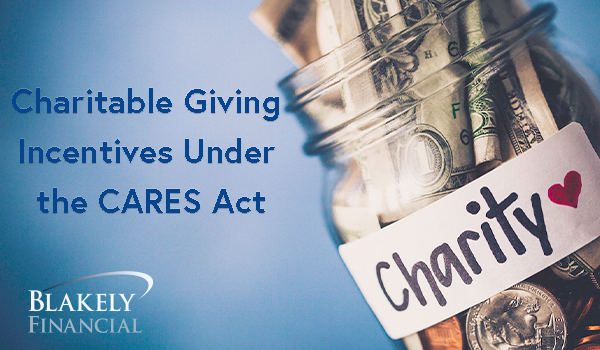Presented by Robert Blakely CFP®, AIF®, ChFC®
With many individuals and families facing catastrophic hardships because of the COVID-19 pandemic, charitable giving to those most adversely affected has become increasingly important. The Coronavirus Aid, Relief, and Economic Security (CARES) Act, enacted in March, includes tax provisions designed to incentivize individuals and companies to make charitable contributions in 2020. These charitable giving incentives do not require that donations be made to charities assisting in the pandemic.
Above-the-Line Charitable Deduction
For the 2020 tax year, each taxpayer can take an above-the-line charitable deduction of up to $300 for certain charitable contributions. Typically, charitable contributions are deductible only for individuals and couples who itemize their deductions; however, this new deduction applies only to those taking the standard deduction. Most taxpayers use the standard deduction since the passage of the Tax Cuts and Jobs Act of 2017, which removed many itemized deductions.
Contributions to a donor-advised fund are not eligible for this above-the-line deduction; therefore, to take this new deduction, taxpayers should verify they are contributing to an eligible charitable cause.
Income Cap Removed for Charitable Contributions
Although the above-the-line deduction is not available for those who itemize their deductions, the CARES Act did make changes to certain tax limitations for those who itemize to incentivize larger gifts. For 2020, the deduction available on cash contributions to charitable organizations has been increased from 60 percent of a taxpayer’s adjusted gross income (AGI) to 100 percent. Taxpayers can carry donations greater than 100 percent of their AGI to future years.
Importantly, this applies only to cash contributions and not to long-term appreciated assets, which enjoy long-term capital gain tax treatment. The charitable deduction for long-term appreciated assets is still capped at 30 percent of AGI. For corporations, the deductibility of cash contributions has been increased temporarily from 10 percent to 25 percent of taxable income.
Like the restrictions related to the above-the-line deduction, the removal of the AGI cap does not apply to gifts made to donor-advised funds.
How Are Qualified Charitable Distributions Affected?
Under the CARES Act, individuals who were required to take a withdrawal from their retirement account in 2020 no longer must do so. How does that waiver of required minimum distributions (RMDs) affect qualified charitable distributions (QCDs)? In short, it doesn’t. Individuals older than 70½ are entitled to make tax-free gifts of up to $100,000 per year, payable directly to charity, from their IRAs. In years when an RMD is required, a QCD of at least the RMD amount would satisfy an individual’s RMD requirement for the year.
Keep in mind that QCDs aren’t required, nor are they limited to the RMD amount. Therefore, the CARES Act has not affected an individual’s ability to make a QCD of up to $100,000 in 2020.
An Excellent Time to Give
With so many in dire need of assistance, it’s a wonderful time to help the community through charitable giving. As a bonus for their generosity, individuals and companies should be sure to use these new tax incentives in 2020.
Engage with the entire Blakely Financial team at WWW.BLAKELYFINANCIAL.COM to see what other financial tips we can provide towards your financial well-being.
ROBERT BLAKELY, CFP® is a financial advisor with BLAKELY FINANCIAL, INC. located at 1022 Hutton Ln., Suite 109, High Point, NC 27262. He is the founder and president of Blakely Financial, Inc. celebrating 25 years in business.
Blakely Financial, Inc. is an independent financial planning and investment management firm that provides clarity, insight, and guidance to help our clients attain their financial goals.
Securities and advisory services offered through Commonwealth Financial Network, Member FINRA/SIPC, a Registered Investment Adviser.
This material has been provided for general informational purposes only and does not constitute either tax or legal advice. Although we go to great lengths to make sure our information is accurate and useful, we recommend you consult a tax preparer, professional tax advisor, or lawyer.
© 2020 Commonwealth Financial Network®

